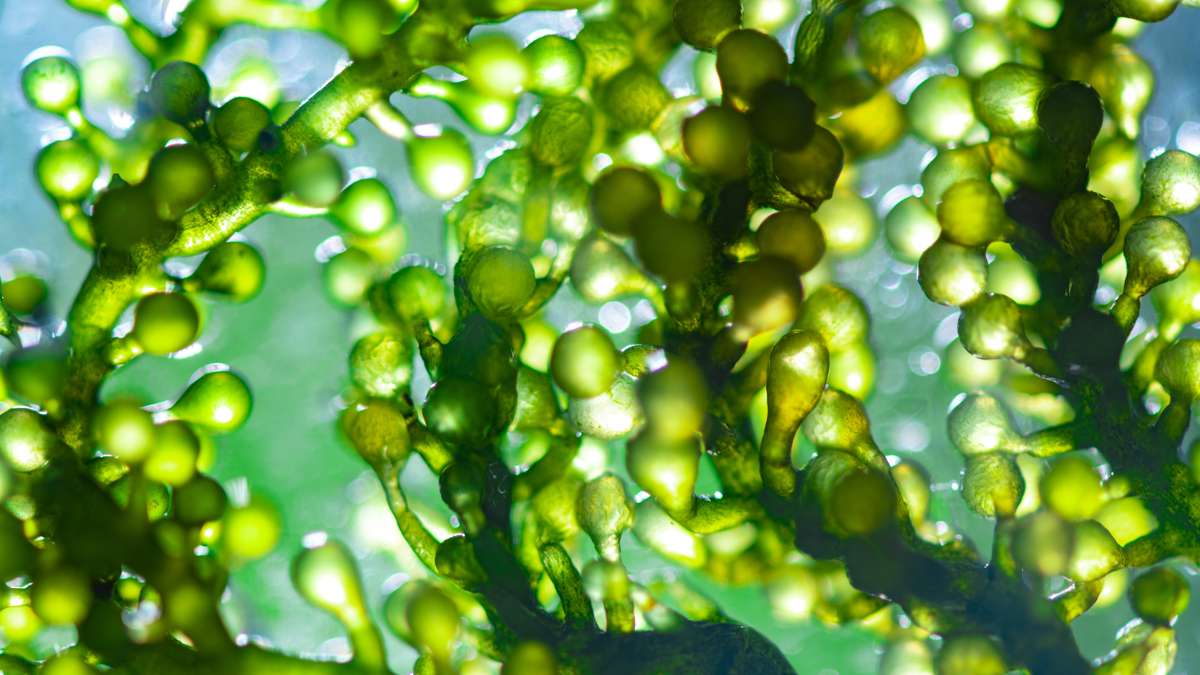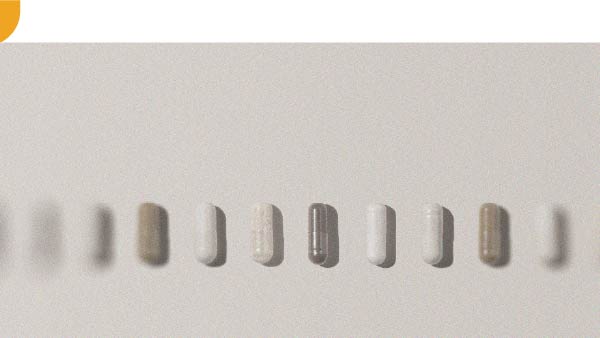The top 6 algae in supplement form
You’re probably aware of the culinary qualities offered by algae and seaweed, but do you know about their health benefits? Here’s a brief overview of the 6 best-known algae and their effects on human health.

Algae: a few general facts
Algae are a large group of plant organisms that are found growing on the sea bed, on our coastlines, and in fresh water.
There are green, red, brown and even micro-algae: in fact, science has not yet identified every type of algae nor uncovered all the mysteries of this particular plant kingdom. They are, however, the subject of increasing research because of their potential benefits for human health.
Spirulina – a type of microalgae and antioxidant superfood
The microalgae spirulina is easily recognised by its bright blue-green colour. Its high content of vitamins, minerals, carotenoids and essential fatty acids has earned it the moniker ‘superfood’.
Spirulina is a source of antioxidants and helps regulate blood sugar levels. It may also boost the body’s natural defences and maintain energy and tone. In addition, its protein content is particularly valuable for vegetarians and vegans. (1)
You can find it in powder form (though its strong taste will not be to everyone’s liking), or in tablet form (for example, in the supplement Spirulina).
Chlorella, invaluable for eliminating toxins
Chlorella is a type of green microalgae which also boasts a nutrient-rich composition. With various amino acids, vitamins A, C and B3, iron and polysaccharides, chlorella is a veritable treasure trove of nutrients.
We know that this purifying algae can absorb and eliminate toxins. A number of studies have shown that it may also help support the body’s defences, boost vitality and maintain healthy gut function (2).
Nutritionally beneficial for the body, chlorella is definitely an important health ally (try, for example, the supplement Chlorella).
Laminaria Japonica or kombu: rich in iodine and fucans
The algae Laminaria Japonica is probably better known as kombu. It contains a large amount of mineral salts and trace elements.
Kombu is also rich in polysaccharides called fucans, which some researchers believe have antioxidant properties (3-6). It’s also thought to help purify the body.
Laminaria Japonicapowder form to liven up your everyday cooking.
The many virtues of Ascophyllum Nodosum or bladder wrack
Bladder wrack, or Ascophyllum, is abundantly harvested from the coastlines of Europe. Green when in water, it darkens on contact with the air. Also rich in fucans, bladder wrack may help support intestinal health, weight loss (alongside dietary interventions) and hydration of the skin.
Ascophyllum also provides a significant amount of iodine, but without increasing salt intake. Iodine is, of course, a key trace element which supports healthy nervous system and thyroid function, and helps maintain good physical and mental energy. (8)
For a supplement with bladder wrack, you could try Fat & Carb Blocker or Natural Iodine, both of which contain different extracts of this algae.
Ecklonia, a type of brown algae packed with antioxidant polyphenols
Perhaps the least known of thebrown algae, ecklonia is nonetheless packed with amazing marine polyphenols called phlorotannins.
These compounds are exceptional antioxidants, which help protect cells against oxidative-stress induced damage (9).
It’s because of this powerful action at a cellular level that ecklonia features among the algae available in supplement form.
AFA: a beneficial blue algae rich in PEA, B12, molybdenum...
Aphanizomenon flos-aqua, or AFA, is reputed to be the most beneficial of all the blue algae. It contains PEA (phenylethylamine), an aromatic compound thought to stimulate neurotransmission and promote positive mood.
AFA also provides vitamins (53% of the recommended daily amount (RDA) for vitamin A, up to 750% of that for vitamin B12...), minerals, amino acids and fatty acids. Remember that vitamin B12 helps to maintain psychological function and reduce fatigue (10).
This algae also contains a significant level of molybdenum (37% of the RDA), a mineral that supports normal metabolism of sulphur-containing amino acids. If you’d like to benefit from AFA’s many properties, then try the excellent supplement AFA Extract.
References
- Khan Z, Bhadouria P, Bisen PS. Potentiel nutritionnel et thérapeutique de la spiruline. Curr Pharm Biotechnol. 2005; 6 (5): 373-379.
- Mason, Russ. (2001). Chlorelle et spiruline: suppléments verts pour équilibrer le corps. Alternative and complementary therapies. 7. 161-165.
- Jing Wang, Quanbin Zhang, Zhongshan Zhang, Zhien Li, Activité antioxydante des fractions de polysaccharides sulfatés extraites de Laminaria japonica, International Journal of Biological Macromolecules, Volume 42, Numéro 2, 2008, Pages 127-132
- L'extrait de Yang HS, Haj FG, Lee M, Kang I, Zhang G, Lee Y.Laminaria japonica améliore la fonction de barrière intestinale en modifiant la réponse inflammatoire et les protéines liées à la jonction serrée dans les cellules Caco-2 stimulées par les lipopolysaccharides. Nutrients. Mai 2019; 11 (5)
- Miyuki Shirosaki, Tomoyuki Koyama, Chapter 15 - Laminaria japonica en tant qu’aliment dans la prévention de l’obésité et du diabète. Advances in Food and Nutrition Research, Academic Press, Volume 64, 2011, Pages 199- 212
- Park, H., Kim, I., Kim, J., et Nam, T. (2013). Induction de l'apoptose et la régulation de la signalisation ErbB par la laminarine dans les cellules cancéreuses du côlon humain HT-29. International Journal of moleculary medicine, 32, 291-295.
- Gammone MA., D'Orazio N. (2015) Activité anti-obésité de la fucoxanthine caroténoïde marine. Marine Drugs.
- Derosa G. et al. (2019) Ascophyllum nodosum et Fucus vesiculosus sur l'état glycémique et sur les marqueurs d'endommagement endothélial chez les patients dysglicémiques. Phytother. Res.
- Wijesekara, I., Yoon, N.Y.et Kim, S.‐K. (2010), Phlorotannins tirés d’Ecklonia cava (Phaeophyceae): Activités biologiques et bénéfices potentiels pour la santé. BioFactors, 36: 408-414.
- https://www.anses.fr/fr/system/files/NUT2003sa0002.pdf
1 Days
Just OK
Just OK, ordering from company for many years and being safisfied
Lynn Mae
2 Days
Recomendo
Produtos encomendados são recebidos atempadamente e de acordo com o anunciado! Muito satisfeita!
Carla Sofia
3 Days
Everything is great!
Everything is great!
Jonas
8 Days
The delivery was fast and the product…
The delivery was fast and the product is great
SOMMARIVA Gianni
9 Days
Great service and lots of information
Great service and lots of information
Gabi
12 Days
Service Satisfaction
I’m satisfied with the service; it fulfilled what it set out to do.
Anfhony Abreu
15 Days
Original product and fast delivery
Original product and fast delivery. I haven't started it yet, but will do soon.
Vincenza Catania
17 Days
Good quality
Good quality. Good service.
Leonel Guzman
19 Days
Top!!!!!!!!
Top!!!!!!!!
Michael
21 Days
Excellent!
Products are great and delivered fast!
PARDINI Debora
22 Days
From order to receive the product
From order to receive the product, the process is smooth & fast. It’s good to customers.
WONG Mei Ling
23 Days
Fast delivery
very quick delivery to italy. product is good.
Customer
24 Days
Prompt delivry !!👍
Prompt delivry !!👍
SWEET Christine
25 Days
Good delivery and flawless quality
AS far as delivery and the visual quality are concerned, Supersmart is excellent. I will not comment on the efficacy of the products themselves, since that is only possible over a longer period and in a large customer base compared to people who do not consume a particular product.
Roger De Backer
26 Days
Perfect services
Perfect services, perfect support, great articles about products
Michaela Alali Beitlová
of experience
your money back
##montant## purchase




